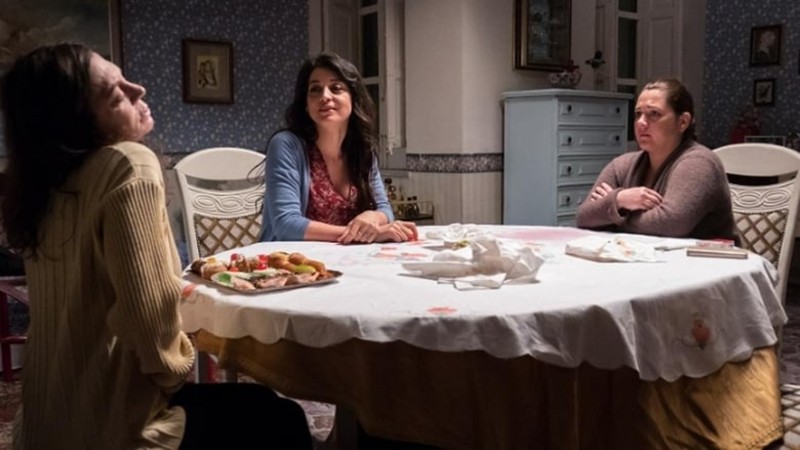




Maria, Pinuccia, Lia, Katia and Antonella are five young sisters enjoying a boisterous childhood and adolescence in the Sicilian capital. They live with their parents in a large seafront apartment, on the top floor of a colourful and vibrant building. They make money by renting doves for ceremonies. Hundreds of birds live in the apartment with them. The birds will promptly return every time they are set free. Both humans and animals are intimately connected to their dwelling.
The sisters have to face both life and death together, and the twists and turns that they make aren’t always smooth and comfortable. One day, the youngest sister Antonella suffers a fatal accident. We don’t see the event and the immediate repercussions, but instead fast-forward three or four decades into the future as the four surviving sisters meet for a dinner after their parents have passed away. What’s intended to be a peaceful and sobering encounter in order to decide the future of the property soon turns ugly. Invidiousness and grudges prevail. The pretty sister Pinuccia has a momentous fight with the ugly and lonely one Lia. Plus a third sister has a very shocking revelation. In the final third of the movie, we see the sisters at old age. The feuding siblings finally make up and find redemption.
Emma Dante’s third movie is based on her very own acclaimed play, written years earlier. This is a film dotted with beautiful and energetic moments, as well as profoundly dark and sad ones. A cheerful walk to the beach complete with vigorous Italian music illustrates the sisters at their pinnacle. A scrawny body and sullen face in a dirty mirror illustrates their nadir. Their bodies have aged and they naturally have to grapple with their physical limitations.

I’m convinced that encountering actors to play the sisters at various ages wasn’t a particularly easy task. Audiences will naturally struggle with continuity. At times, I could hardly work out who was who at adulthood and also at old age. Plus the film zigzags back and forth in time, creating a sense of disorientation. This does make the film a little confusing at times, if still moving and enjoyable.
This Italian production is very candid in its representation of people and animals. “Animals are like people”, clarifies one of the sister. The doves remain in the apartment up until the end of the film. Will they outlive the sisters? On the other hand, The Macaluso Sisters is guaranteed to ruffle some feathers amongst animal lovers. They will not be pleased to see doves dyed pink and animals being skinned in graphic detail.
The seafront building is also a film character per se. It has emotions. It ages. And it bears scars. The significance of the final sequence cannot be overstated. That’s when the apartment is stripped to its bare essentials, heralding the inevitable deconstruction of the sisterhood. Families come to an end. households come to end. Lives come to an end. Nothing lasts forever.
The Macaluso Sisters is showing in Competition at the 77th Venice International Film, Festival, which is taking place right now.











